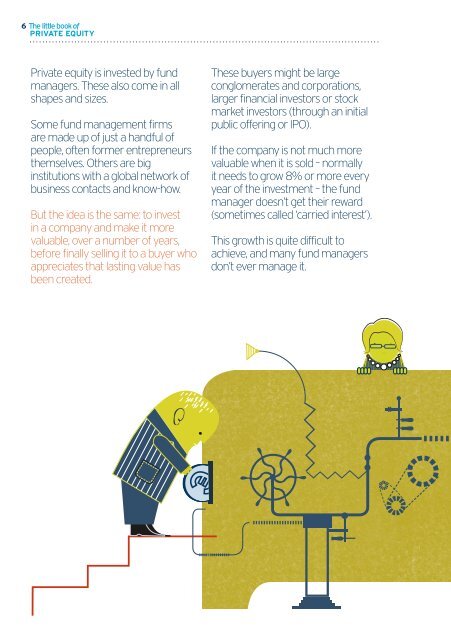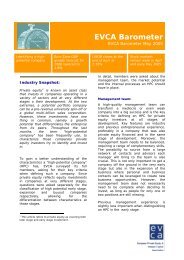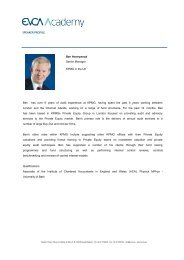The little book of Private Equity - EVCA
The little book of Private Equity - EVCA
The little book of Private Equity - EVCA
You also want an ePaper? Increase the reach of your titles
YUMPU automatically turns print PDFs into web optimized ePapers that Google loves.
6 7<br />
<strong>Private</strong> equity is invested by fund<br />
managers. <strong>The</strong>se also come in all<br />
shapes and sizes.<br />
Some fund management firms<br />
are made up <strong>of</strong> just a handful <strong>of</strong><br />
people, <strong>of</strong>ten former entrepreneurs<br />
themselves. Others are big<br />
institutions with a global network <strong>of</strong><br />
business contacts and know-how.<br />
But the idea is the same: to invest<br />
in a company and make it more<br />
valuable, over a number <strong>of</strong> years,<br />
before finally selling it to a buyer who<br />
appreciates that lasting value has<br />
been created.<br />
<strong>The</strong>se buyers might be large<br />
conglomerates and corporations,<br />
larger financial investors or stock<br />
market investors (through an initial<br />
public <strong>of</strong>fering or IPO).<br />
If the company is not much more<br />
valuable when it is sold – normally<br />
it needs to grow 8% or more every<br />
year <strong>of</strong> the investment – the fund<br />
manager doesn’t get their reward<br />
(sometimes called ‘carried interest’).<br />
This growth is quite difficult to<br />
achieve, and many fund managers<br />
don’t ever manage it.<br />
Stock market investing is much<br />
better known than private equity.<br />
But there are important differences<br />
in how private equity governs and<br />
controls companies.<br />
Since listed companies have so<br />
many owners, they can’t all be<br />
involved in the running <strong>of</strong> the<br />
business. So the task is given to<br />
‘executives’ who wield significant<br />
power, with reference to their<br />
disparate owners.<br />
This system <strong>of</strong> executive<br />
stewardship severs the concept <strong>of</strong><br />
management <strong>of</strong> businesses from<br />
their ownership (sometimes called<br />
‘the agency problem’). Even with<br />
the best intentions, the result can<br />
be a misalignment <strong>of</strong> interest and<br />
sometimes excessive personal<br />
rewards despite poor performance.<br />
In private equity, companies are<br />
owned by a small number <strong>of</strong><br />
pr<strong>of</strong>essional investors, through a<br />
chain <strong>of</strong> command that directly links<br />
value with reward, from company<br />
managers through to private equity<br />
fund managers, and back through to<br />
the fund.<br />
Such clear accountability has<br />
many benefits. For instance, it gives<br />
comfort to potential lenders, allowing<br />
private equity-backed companies<br />
to attract relatively cheaper debt<br />
finance for their activities, alongside<br />
the private equity.

















